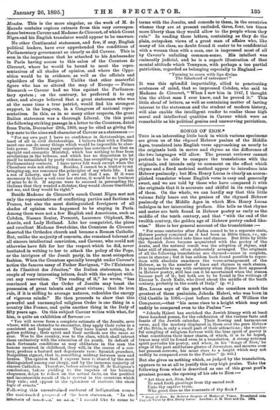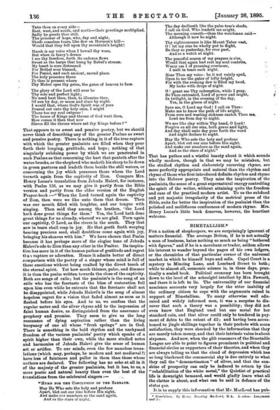SONGS OF ZION.* THIS is an interesting little book in
which various specimens are given us of the rhymed Hebrew psalms of the Middle Ages, translated into English verse approaching as nearly to the originals both in metre and rhyme as the difference of the two languages will allow. The present reviewer cannot pretend to be able to compare the translations with the originals, and intends only to comment on the effect which rhyme and a fixed metrical method appear to introduce into Hebrew psalmody ; but Mrs. Henry Lucas is clearly an accom- plished translator whose English verse is easy and generally sweet, and we are told by those who have compared it with the originals that it is accurate and skilful in its renderings of them. On the whole, we can hardly say that this little volume fully bears out the praises of the rhymed Hebrew psalmody of the Middle Ages in which Mrs. Henry Lucas indulges in her interesting preface. She tells us that rhyme and metre are both found in Hebrew poetry as early as the middle of the tenth century, and that " with the end of the twelfth century, the golden age of Hebrew poetry ended like- wise." Here is her general account of the translations :-
" For some centuries after Judea ceased to be a separate state,. Hebrew poetry remained as it had been in Bible times, i.e., un- rhymed and undivided into lines and stanzas. But little by little the Spanish Jews became acquainted with the poetry of the Arabs, and the natural result was the adoption of rhyme, and later still of stanzas, often elaborately arranged. The originals of all the following translations are rhymed—some in couplets,. some in stanzas ; but it has seldom been found possible to repro- duce with absolute exactness the verse-arrangement of the Hebrew, as to the number of lines and rhymes in each stanza. It is impossible to say with certainty when rhyme first appeared in Hebrew poetry, still less can it be ascertained when the stanza became part of it ; but both are to be found in the writings of Eleazar b. Jacob Kalir, who lived about the middle of the tenth century, probably in the south of Italy." (p. vi.)
Mrs. Lucas says of the poet whom she considers much the greatest of these psalmists, Jehuda Halevi, who was born in Old Castile in 1086,—jast before the death of William the Conqueror,—that "his muse rises to a height which may not unfitly be compared even to the Psalms ":—
" Jehuda Halevi has enriched the Jewish liturgy with at least three hundred poems, for the celebration of the various fasts and feasts of the Jewish calendar. Their flowing and harmonious verse, and the mastery displayed in them over the pure Hebrew of the Bible, is only a small part of their attractions ; the wonder- ful mingling of religious fervour with the true spirit of poetry is what constitutes their inner charm, of which, it is to be hoped, traces may still be found even in a translation. A strong national spirit pervades his poetry, and when, in his Songs of Zion: he sings of the past and future glories of Jerusalem, and mourns over her present sorrows, his muse rises to a height which may not unfitly be compared even to the Psalms." (p.
Bnt she gives us nothing which, as judged by the translation, appears to us at all to justify this very high praise. Take the following from what is described as one of this great poet's greatest poems, the opening of his ode to Zion :— " Art thou not, Zion, fain
To send forth greetings from thy sacred rock Unto thy captive train, Who greet thee as the remnants of thy flock ?
• Songs of Zion. By Hebrew Singers of Medue,a1 Times. Translated fate Tug lat. Verse by Mrs. Henry Lucas. London: J. H. Dent and Co. 1861 Take thou on every side—
East, west, and south, and north—their greetings multiplied.
Sadly he greets thee still, The prisoner of hope, who, day and night,
Sheds ceaseless tears, like dew on Hermon's hill—
Would that they fell upon thy mountain's height!
Harsh is my voice when I bewail thy woes, But when in fancy's dream I see thy freedom, forth its cadence flows Sweet as the harps that hung by Babel's stream.
My heart is sore distressed For Bethel ever blessed,
For Peniel, and each ancient, sacred place.
The holy presence there To thee is present where
Thy Maker opes thy gates, the gates of heaven to face.
The glory of the Lord will ever be
Thy sole and perfect light; No need Last thou, then, to illumine thee, Of sun by day, or moon and stars by night.
I would that, where God's Spirit was of yore
Poured out unto thy holy ones, I might There too my soul outpour !
The house of Kings and throne of God wert thou, Row comes it then that now Slaves fill the throne where sat thy Kings before ? "
That appears to us sweet and pensive poetry, but we should never think of describing any of the greater Psalms as sweet and pensive poetry. There is nothing in it of the true rapture with which the greater psalmists are filled when they pour forth their longing, gratitude, and hope ; nothing of that singularly subduing power by which we are penetrated in such Psalms as that concerning the hart that panteth after the water-brooks, or the shepherd who maketh his sheep to lie down in green pastures and leadeth them beside the still waters, or concerning the joy which possesses those whom the Lord turneth again from the captivity of Zion. Compare Mrs.
Henry Lucas's translation from Jehuda Halevi, for instance, with Psalm 126, as we may give it partly from the Bible version and partly from the older version of the English Prayer-book :—" When the Lord turned again the captivity of Zion, then were we like unto them that dream. Then was our mouth filled with laughter, and our tongue with singing. Then said they among the heathen, 'the Lord Lath done great things for them.' Yea, the Lord bath done great things for us already, whereof we are glad. Turn again our captivity, 0 Lord, as the rivers in the south. They that sow in tears shall reap in joy. He that goeth forth weeping bearing precious seed, shall doubtless come again with joy, bringing his sheaves with him." We have chosen that Psalm because it has perhaps more of the elegiac tone of Jehnda Halevi's ode to Zion than any other in the Psalter. Its inspira- tion has more in it of the human pathos of gratitude and regret ti at rapture or adoration. Hence it admits better of direct comparison with the poetry of a singer whose mind is full of these emotions without being exalted by the direct touch of the eternal spirit. Yet how much thinner, paler, and dimmer it is than the psalm written towards the close of the captivity. Both are songs of exile; but the psalmist's is the song of an exile who has the foretaste of the bliss of restoration full upon him even while he entreats that the foretaste shall not be disappointed, while Jehuda Halevi's is the song of almost hopeless regret for a vision that faded almost as soon as it flashed before his eyes. And to us, we confess that the regular metre and the silver rhyme add to the impression of faint human desire, as distinguished from the assurance of prophecy and promise. They seem to give us the long resonance of dying aspiration rather than the living buoyancy of one all whose " fresh springs " are in God.
There is something in the bold rhythm and the unrhymed freedom of the various psalmists' poetry which speaks of a spirit higher than their own, while the more studied notes and harmonies of Jehuda Halevi give the sense of human art or artifice. To our minds, even the few nameless trans- lations (which may, perhaps, be modern and not medimval P) have less of faintness and pallor in them than those whose authors are declared. The following has no echo at all in it of the majesty of the greater psalmists, but it has, to us, a more poetic and natural beauty than even the best of the translations from the celebrated singers "'Hunt FOB THE CONCLUSION OF THE SABBATH.
May He Who sets the holy and profane Apart, blot out our sins before His sight, And make our numbers as the sand again, And as the stars of night. The day declineth like the palm.tree's shade, I call on God, Who leadeth me aright,
The morning cometh—thus the watchman said— Although it now be night.
Thy righteousness is like Mount Tabor vast, 0 ! let my sins be wholly put to flight, Be they as yesterday, for ever past,
And as a watch at night.
The peaceful season of my prayers is o'er, Would that again had rest my soul contrite, Weary am I of groaning evermore, I melt in tears each night.
Hear Thou my voice : be it not vainly sped, Open to me the gates of lofty height,
For with the evening dew is filled my head, My locks with drops of night.
0 ! grant me Thy redemption, while I pray, Be Thou entreated, Lord of power and might, In twilight, in the evening of the day, Yea, in the gloom of night.
Save me, 0 Lord my God ! I call on Thee : Make me to know the path of life aright,
From sore and wasting sickness snatch Thou me, Lead me from day to night.
We are like clay within Thy hand, 0 Lord! Forgive us all our sins, both grave and light, And day shall unto day pour forth the word And night declare to night.
May He Who sets the holy and profane Apart, blot out our sins before His sight, And make our numbers as the sand again, And as the stars of night."
That has pathos and a wistful beauty about it which sounds wholly modern, though in that we may be mistaken, but the studied rhythm and elaborately recurring rhyme, are more perfectly appropriate and natural than the rhythm and rhyme of those who first introduced definite rhythm and rhyme into the Hebrew poetry. They miss the inspiration of the psalmists, the sense of a great supernatural energy controlling the spirit of the writer, without attaining quite the freedom and ease of the practised modern artist. To us the subdued and yet majestic irregularity of the metrical prose of the Bible, suits far better the inspiration of the psalmist than the polished and mellifluous confluences of modern rhyme. Mrs. Henry Lucas's little book deserves, however, the heartiest welcome.



















































 Previous page
Previous page